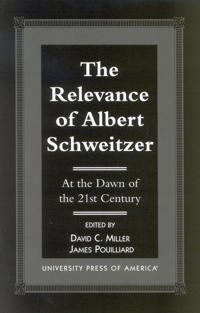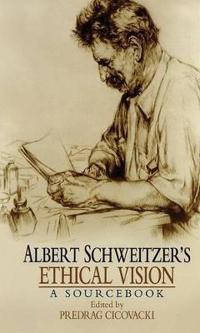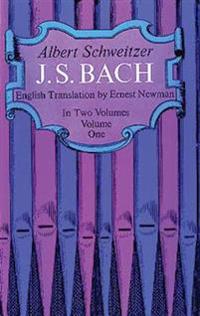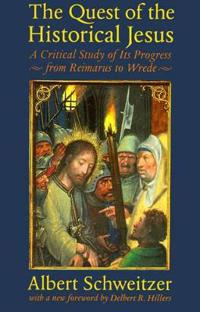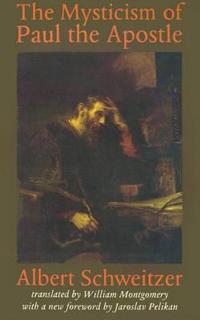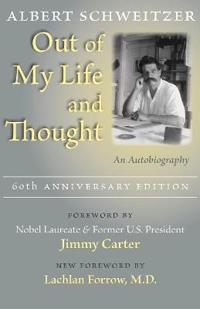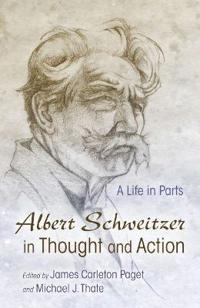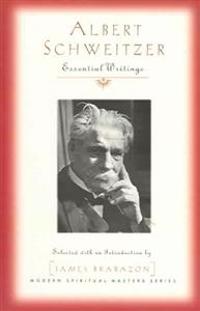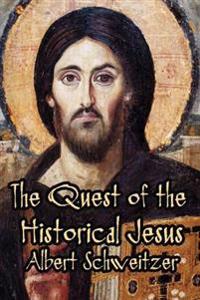Albert Schweitzer's Mission (Häftad)
avAlbert Schweitzer, Norman Cousins
ISBN: 9780393331226 - UTGIVEN: 198510The Relevance of Albert Schweitzer at the Dawn of the 21st Century (Pocket)
avDavid C. (EDT) Miller, James (EDT) Pouilliard, International Albert Schweitzer Colloquium (1990 United Nations)
ISBN: 9780761818342 - UTGIVEN: 2000-11No descriptive material is available for this title.
The Animal World of Albert Schweitzer: Jungle Insights Into Reverence for Life (Inbunden)
avAlbert Schweitzer, Charles R. Joy
ISBN: 9781258922696 - UTGIVEN: 2013-10Albert Schweitzer's Ethical Vision (Häftad)
ISBN: 9780195377897 - UTGIVEN: 200902Albert Schweitzer's leading philosophical idea was "reverence for life": good consists in maintaining and perfecting life, evil in destroying and obstructing life. For Schweitzer, all life is sacred, and ethics deals with human attitudes and behavior toward all living beings. Unlike most other moral[...]
The Quest Of The Historical Jesus (Pocket)
avAlbert Schweitzer, W. Montgomery, F. C. Burkitt
ISBN: 9780486440279 - UTGIVEN: 200502Groundbreaking study that established the reputation of the famed theologian traces the search for the historical person of Jesus. Schweitzer examines works of more than 50 eighteenth- and nineteenth-century authors and scholars and concludes that many of the earlier historical reconstructions of Ch[...]
The Quest of the Historical Jesus (Häftad)
avAlbert Schweitzer
ISBN: 9780801859342 - UTGIVEN: 199804In the last decades of the eighteenth century, old arguments about what constituted true Christianity resumed with the newly refined tools and methods of linguistics, history, and comparative literature. The most sensitive questions sought to probe through the centuries and discover the original Jes[...]
The Mysticism of Paul the Apostle (Häftad)
avAlbert Schweitzer Library
ISBN: 9780801860980 - UTGIVEN: 199811Immediately after the Gospels, the New Testament takes up the history of the early Christian Church, describing the works of the twelve disciples, and introducing Paul, the man whose influence on the history of Christianity is beyond calculation. Teacher, preacher, conciliator, diplomat, theologian,[...]
Out of My Life and Thought (Häftad)
avAlbert Schweitzer
ISBN: 9780801894121 - UTGIVEN: 200907Published to commemorate Albert Schweitzer's only visit to the United States 60 years ago, this anniversary edition of his autobiography gives 21st-century readers a unique and authoritative account of the man John F. Kennedy called "one of the transcendent moral influences of our century." Schweit[...]
Albert Schweitzer (Häftad)
avJames Brabazon
ISBN: 9780815606758 - UTGIVEN: 2000-10The second edition of this biography of humanitarian Albert Schweitzer has been updated to include documents discovered since the work was originally written, including the letters between Schweitzer and Helene Bresslau written during the ten years before their marriage. This correspondence tells of[...]
Albert Schweitzer in Thought and Action
ISBN: 9780815634645 - UTGIVEN: 2016-12In the 1940s and 1950s, Albert Schweitzer was one of the best-known figures on the world stage. Courted by monarchs, world statesmen, and distinguished figures from the literary, musical, and scientific fields, Schweitzer was awarded the Nobel Peace Prize in 1952, cementing his place as one of the g[...]
The Philosophy of Civilization, Part 1-2: The Decay and the Restoration of Civilization, and Civilization and Ethics (Inbunden)
avAlbert Schweitzer
ISBN: 9781258948665 - UTGIVEN: 2013-10Paul and His Interpreters: A Critical History (Häftad)
avAlbert Schweitzer, El Greco
ISBN: 9781494701093 - UTGIVEN: 2013-12Reverence for Life (e-bok)
avAlbert Schweitzer
ISBN: 9781497675742This book has a collection of Schweitzer's quotations on ethics and the human spirit. The emphasis is on the importance of the reverence for life and how following that ethic leads us to what is essential for civilization. The table of contents: Introductory Note; Feeling for Animal Life; Respect fo[...]
Albert Schweitzer (Häftad)
ISBN: 9781570756023 - UTGIVEN: 200511"Albert Schweitzer (1875-1965), theologian, doctor, Nobel Peace Prize winner - was a remarkable figure of the twentieth century. An ordained pastor and theologian, he was also a renowned musician. He gave up this success to become a missionary doctor and founded a hospital in Africa. He is famous fo[...]
The Quest of the Historical Jesus (Häftad)
avAlbert Schweitzer, F. Crawford Burkitt
ISBN: 9781613422076 - UTGIVEN: 2014-07The Restoration of Albert Schweitzer's Ethical Vision (Häftad)
avPredrag Cicovacki
ISBN: 9781628923469 - UTGIVEN: 2014-01In 1913, Albert Schweitzer (1875-1965) left his internationally renowned career as a theologian, philosopher, and organ player to open a hospital in the jungles of Africa. There he developed in theory and practice his ethics of reverence for life. When he published his most important philosophical w[...]
Geschichte der Leben-Jesu-Forschung (Pocket)
avAlbert Schweitzer
ISBN: 9783161446269 - UTGIVEN: 1984-01Zwischen Wasser und Urwald (Pocket)
avAlbert Schweitzer
ISBN: 9783406573026 - UTGIVEN: 200803Der junge Theologieprofessor Albert Schweitzer brach im Jahre 1905, im Alter von dreiÃig Jahren, seine akademische Karriere ab, studierte Medizin und schiffte sich 1913 nach Afrika ein, um im Dienst der französischen Missionsgesellschaft im Urwald Ãquatorialafrikas eine medizinische Sta[...]
Geschichte der Leben-Jesu-Forschung (Pocket)
avAlbert Schweitzer
ISBN: 9783825213022 - UTGIVEN: 1984-01Am Anfang des 20. Jahrhunderts erschienen, ist dieses Werk des jungen Albert Schweitzer inzwischen zu einem theologischen Klassiker geworden. Es zog den Schlußstrich unter 150 Jahre historisch-kritischer Forschung und setzte einen neuen Anfang. Es macht die Geschichte der Leben-Jesu- Forschung, die[...]


